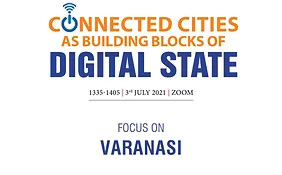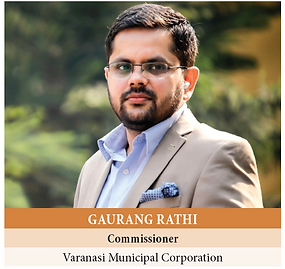CONNECTED CITIES AS BUILDING BLOCKS OF
DIGITAL STATE -
FOCUS ON VARANASI

Our cities today are not just about infrastructure but about the delivery of citizen services efficiently and in a timely manner. Traditionally known to be responsible only for sanitation and waste management, the cities today need to add to the ease of living.
Cities have also added a lot of components to their responsibilities like urban renewal, urban expansion, technology-enabled smart and efficient infrastructure including Smart Cities and AMRUT cities. Since these are myriad components that are spread across various departments at the Centre as well as the state level, it is important to get an integrated view of urban development initiatives.
Local governments, in partnership with the State Governments and Central government, have rolled out technology-led reforms in a PPP mode. This has made citizen engagement inclusive and citizen services accessible using digital tools. Citizen feedback has assumed importance like never before. Policymakers at appropriate levels can take real-time decisions to make cities safer, prosperous, and sustainable. Monitoring of projects and performance, in addition to redressing citizen grievances, can be done in a timely manner.
Cities today are burdened with a long list of functions that pose a challenge in efficient functioning. The cities of the future need funds, functions, and functionaries that are connected with each other. Equally important are the technologies that can predict the requirements of citizens in the short as well as the long term and address the demand side. We have been studying several such interventions at the city level on a year-on-year basis and find that many of such projects are at varied levels of performance while each city has its own set of priorities and challenges. This is published annually as SKOCH State of Governance Report Card on Cities.
We would like to learn from such experiences and also document them so that others can take note of and learn from the best practices in the area. Needless to say, that you have covered a lot of ground, and our effort would be to understand these in the correct perspective so that your achievements could be documented and appropriately benchmarked.
Proposed Discussion areas:
- To what extent has the city governance become connected and its outcomes?
- To what extent has the city governance become connected and its outcomes?
- How well are citizens being able to participate and give feedback to improve city governance?
- How are cities moving from day-to-day handling of issues to more analytical and predictive governance?
- City Vision 2024.
Focus on Varanasi
03 July 2021 | 13:35-14:05 hrs

Profile
Mr. Gaurang Rathi, IAS Batch of 2014, is the Municipal Commissioner of Varanasi Nagar Nigam and CEO of Kashi Vishwanath Temple Visith Chetra Vikas Parishad. He completed his graduation with B.Tech in Textile Engineering from IIT-Delhi. He began his administrative career at Moradabad, then moved on to the Ministry of Textile’s Handloom Department as an Assistant Secretary, then to Bahraich as an SDM before being sent to Varanasi.
Digital State Meeting Video
| Time | Person |
|---|---|
| 13:35 - 13:50 | Mr. Gaurang Rathi, Commissioner, Varanasi Municipal Corporation |
|
13:50 - 14:05 (Disscussants) |
Discussion |
| Dr. M Ramchandran, Distinguished Fellow, SKOCH Development Foundation | |
| Dr. Deepali Pant Joshi, Distinguished Fellow, SKOCH Development Foundation, Chairman, National Urban Transport Awards Committee and Former Secretery-Urban, Government of India | |
| Mr. Sujit Patheja, Director- Smart Cities & Urban Governance, SAP India |

